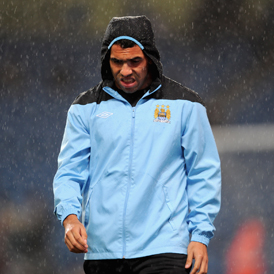Tevez refuses to play for Man City. So what?
There has been universal execration of Carlos Tevez, who is alleged to have refused to play for Manchester City in Munich. But football writer Simon Kuper tells Channel 4 News: what’s the big deal?

The Argentina international left City boss Roberto Mancini seething after seemingly refusing to leave the substitutes’ bench 10 minutes into the second-half with City trailing 2-0 to Bayern Munich in their Champions League tie.
Mancini later claimed the behaviour was “not acceptable” and if he had his way, Tevez would never play for the Blues again; ultimately the player’s objective, having asked for a transfer away from the club in the last two windows.
The forward, thought to be on £200,000-per-week wages, has since claimed he did not refuse to play, without tendering an alternative explanation, and also said he was ready to “fulfil his obligations to the club”.
But his protests of innocence have fallen on deaf ears and the condemnations have been vociferous in the extreme.
Graeme Souness, a former player and manager, said: “I’m in disbelief. Why would a player not want to go on and help his teammates? How selfish can you get? Because you didn’t start: how petulant can you be?
“You chase him as far as you can from Manchester tomorrow, because he is one bad apple and that can spread. He’s a disgrace to football. Your man on the street thinks there’s a lot wrong with modern footballers. He epitomises what that man thinks.”
And other observers have called for Man City to force Tevez to “rot in the reserves,” or to have his contract nulled entirely.
But Simon Kuper, author of Football Against the Enemy and a football journalist for the Financial Times, said he is surprised by the shock and the vitriol that followed the incident.
“I struggle to see why this has shocked anyone, and also why it’s supposed to be so terrible thing,” he told Channel 4 News.
If Tom Finney and Bobby Moore were in the modern game, they would not be loyal. Simon Kuper
“Player power eclipsed manager power – with regard to the best players as opposed to the average ones – a long time ago with the Bosman ruling.
“People talk about pride and passion and loyalty in football but I don’t buy the idea that those things were ever a part of the game.
“A club is an employer: you may enjoy your job but do you love the bank you work for? Probably not. Would you stay at your company if there were better offers elsewhere out of loyalty? Again, no.”
He added: “People always refer to Tom Finney (an England international who played exclusivley for Preston North End from the 1940s-60s) and Bobby Moore as examples of loyal players. But they stayed at their clubs because they had to. If they were in the modern game, they would not be loyal.”
Not so, according to Tottenham Hotspurs manager Harry Redknapp who described Tevez’s behaviour as “beyond belief”.
“I just wonder what City legends like Malcom Allison and Mike Summerbee would have thought of seeing a player refuse to play in a Champions League game. It is beyond belief,” he said.
Although a player refusing to take to the field as a substitute is a first for a Premier League team, insubordination is not, with players’ refusing to train a growing trend and often a precursor to a transfer.
Redknapp’s own striker, Emmanuel Adebayor refused to train with his former club Manchester City in an attempt to force a move away from Eastlands.

And it is not just the Tevezes and Adebayors of the football world – peripatetic players with long histories of controversy – who go on strike. Even the world’s best player is prone to the odd strop, verging on mutiny, according to Mr Kuper.
“Near the end of last season in La Liga, Leo Messi was left on the bench because the manager wanted to rest him.
“He then refused to train the next day, just didn’t show up. That’s gross insubordination, but what can you do? The top players can do as they wish now.”
And PFA chairman Gordon Taylor predicted more of the same to come.
“I think you are going to see a lot more instances of top players getting upset,” he said.
“They will either think they don’t deserve to come off, or not be happy at being asked to retrieve a situation.
“But it is part and parcel of being in a large squad. You have to be professional.”
Mr Kuper refers to the now former Real Madrid general manager Jorge Valdano who bemoaned the increase in so-called player power over their employers. “He talked about how difficult it was just to speak to a player. If the manager wanted to give a player a dressing down, he’d end up only being able to talk to the player’s agent or lawyer or father.”
And indeed Tevez himself turned his phone off when Mancini called him while on holiday this summer.
Mr Kuper said that it is time to stop viewing football through an anachronistic lens, that the idea of loyalty, obedience and service no longer exists, if ever it did.
“Footballers play for themselves,” he said.
“Everyone has a career, which they want to further; preferably the right club at the right time. It’s not necessarily ego, its individual careers. No one really plays for City, just as no one plays for Man Utd or anyone else. The rules have changed and they changed long ago.”
-
Latest news
-
Yungblud launches his own affordable music festival5m

-
Why these Americans want to quit their state9m

-
Company behind infected water outbreak are ‘incompetent’ says local MP5m

-
Israeli forces push deeper into Northern and Southern Gaza4m

-
India’s ‘YouTube election’: Influencers enlisted to mobilise youth vote6m

-




